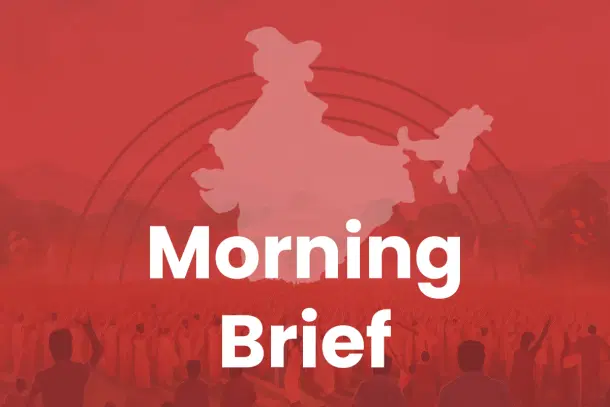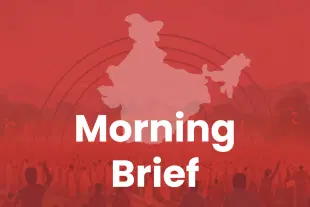News Brief
Morning Brief: India’s Cyber War Game To Simulate Chinese Attack On Critical Infra; iPhone Exports From India Rise Despite Trump's Warning; Wholesale Inflation At 14-Month Low
Swarajya Staff
Jun 17, 2025, 08:24 AM | Updated 09:42 AM IST
Save & read from anywhere!
Bookmark stories for easy access on any device or the Swarajya app.


Kick-start your morning with Swarajya’s Morning Brief – your news fix, curated for clarity and insight.
India’s Cyber War Game To Simulate Chinese Attack On Critical Infra
In the wake of sustained cyber attacks during Operation Sindoor, the Defence Cyber Agency has launched a nationwide exercise to test the resilience of India’s military cyber infrastructure. The exercise, named Cyber Suraksha, will simulate large-scale attacks on critical infrastructure—similar to those expected from China in the event of a conflict—and assess the defensive and analytical capabilities of key national cyber units.
Over 100 participants from defence and national-level cyber agencies are involved in the high-intensity, gamified drill aimed at reinforcing secure practices and ensuring operational readiness. Officials said such exercises will be held regularly to build a “security-first culture” across all levels of defence.
Export Of India-Made iPhones To US Surges Despite Trump’s Warning
India exported 20.4 million iPhones from January to May 2025 — a 57 per cent year-on-year jump — with 77 per cent of those headed to the US, up from 54 per cent last year, according the businessline. The surge comes despite US President Donald Trump's push for Apple to shift production back home.
Tata’s rapid rise as a contract manufacturer has driven much of the export growth, with its share rising from 13 per cent in 2024 to 37 pet cent this year. Foxconn still leads with 52 per cent of exports, but Tata’s expansion in Hosur and acquisition of Wistron’s Karnataka facility has made it Apple’s second key partner in India. Meanwhile, iPhone shipments from China to the US continue to shrink due to ongoing tariff tensions.
Wholesale Inflation Hits 14-Month Low
India’s wholesale inflation eased to a 14-month low of 0.4 per cent in May, thanks to a broad drop in food, fuel, minerals, and manufacturing prices. Food inflation slowed to 1.7 per cent—its lowest in over a year and a half—helped by sharp declines in vegetable, pulse, and cereal prices.
Economists warn that the trend may reverse in June due to rising crude oil prices driven by tensions in West Asia. Potato and onion prices also fell steeply, while fruits were an outlier, rising over 10 per cent year-on-year. Recent data also showed retail inflation easing to a 75-month low of 2.8 per cent, with food inflation at a 43-month low.
Other Developments
India Seeks US Assurances Against Future Tariffs After Trade Deal
India is seeking assurances from the US that no additional tariffs will be imposed once a trade agreement is concluded, amid concerns over potential policy shifts. With negotiations in the final stages, New Delhi has demanded tariff concessions on key labour-intensive sectors such as textiles and leather, and is pushing for a mechanism to ring-fence the agreement from future unilateral changes.
The two sides are aiming to finalise at least an early harvest agreement before July 9, when the current pause on US-imposed reciprocal tariffs expires. India has signalled that a meaningful expansion in bilateral trade—targeted to cross $500 billion by 2030—will require substantial reductions in US tariff barriers.
India Maps Out Oil Alternatives
Amid escalating tensions between Iran and Israel, Indian oil ministry officials and energy executives are assessing contingency plans to secure fuel supplies if Iran disrupts shipping through the Strait of Hormuz. With about 40 per cent of India’s crude and 54 per cent of its LNG imports passing through the strait, any closure could trigger a supply shock.
India is eyeing West Africa and other sources for alternative oil and gas, though executives believe Iran is unlikely to blockade the route. Indian refiners are avoiding panic buying but remain alert to possible supply disruptions and price spikes.
Any redirection of Indian demand to West Africa could be followed by other nations, adding to market pressure. India, which imports 90 per cent of its crude needs, sourced 35 per cent from Russia and 40 per cent from the Gulf as of May, with Africa's share recently dropping to 5 per cent.
'Everyone Should Immediately Evacuate Tehran!': Trump
US President Donald Trump urged civilians to “immediately evacuate Tehran” in a late-night post on Truth Social, just hours after Israel issued evacuation warnings to residents of central Tehran. Trump reiterated his longstanding stance that “Iran cannot have a nuclear weapon,” blaming Tehran for failing to sign the deal he had once proposed.
The Israeli evacuation order signaled a shift in its campaign—from targeting military and nuclear sites to focusing on Iran’s oil sector and even the capital. Israeli strikes reportedly hit Iranian state media during a live broadcast, deepening panic in Tehran. Meanwhile, Iran responded with missile barrages, escalating the conflict. Trump left the G7 summit early, citing the Middle East crisis as the reason.
From The States
Mamata Blames BJP-Led Centre for Tragedies, Fund Cuts
West Bengal Chief Minister Mamata Banerjee has lashed out at the Centre, calling it a “government of thieves” responsible for a “procession of deaths” following recent tragedies in Ahmedabad, Uttarakhand, and Pune that claimed nearly 290 lives. Addressing BJP MLAs in the state assembly, Banerjee accused the party of failing to prevent mishaps in its governed states while depriving Bengal’s poor of central funds.
She said the 2026 state elections would reduce the BJP to “a big zero,” and questioned their moral right to speak on corruption. Banerjee argued that Muslims make up 30 per cent of Bengal’s population and must be treated equally.
Omar Abdullah Warns Patience Running Out Over Power Split in J&K
J&K Chief Minister Omar Abdullah has warned that his patience with the current dual power structure in the Union Territory has limits, saying “everything comes with an expiry date.” Abdullah criticised the overlap between the elected government and the Lieutenant Governor’s office, calling it “the worst form of governance.” He accused the LG of encroaching on governance functions.
Abdullah said the J&K Cabinet has framed new business rules to define administrative boundaries and urged the LG to endorse them. He also blamed the LG’s approach for the handling of the Pahalgam terror attack and dismissed any suggestion that the tragedy could justify the dilution of Article 370.
Sukhbir Banks on Rebel Returns to Revive SAD
With several veteran leaders returning to Shiromani Akali Dal (SAD), party chief Sukhbir Badal is hoping for a political revival. The rejoining of Sikander Singh Maluka—just ahead of the June 19 Ludhiana West bypoll—is seen as a tactical move, as Sukhbir tries to strengthen SAD’s campaign against the AAP government. Maluka, once expelled over his proximity to BJP-linked family members, has been given a key campaign role by Sukhbir, signalling the party’s reconciliatory approach to rebels.
Despite a sharp decline in its electoral strength and internal dissent, Sukhbir has been re-elected as party president and is eyeing a comeback in Punjab politics. With SAD holding just one MLA in the 117-member assembly, the party sees these “ghar wapasi” moments as crucial to rebuilding its base ahead of the 2027 elections.
You’re all caught up—until next time.





